Psychiatrist perfectly explains why each generation approaches happiness so differently

Dr. Judith Joseph is the expert on joy and happiness
Fill in the blank: Happiness is...?
Owning a home with a white picket fence and two-car garage? Achieving the ideal work-life balance? Or having legions of faithful followers on TikTok who hang onto your every word?
When we think about happiness, we often assume everyone wants the same things. However, depending on your answer to the question, "What is happiness?" many psychologists could pinpoint approximately when you were born. The generation you are a part of determines so much: whether you've ever had a perm, how comfortable you are using the Internet, and even how you define joy itself.
It's all about context.
Dr. Judith Joseph, a board-certified psychiatrist and the author of High Functioning: Overcome Hidden Depression and Reclaim Your Joy, went viral on Instagram when she explained how collective experiences shape each generation's approach to happiness.
"People from different generations have different ways of addressing happiness based on their different collective traumas, experiences, and educational opportunities," she wrote in the caption.
About Dr. Judith Joseph
Dr. Judith Joseph is more than just a phenomenal content creator—her professional resume is mind-bogglingly impressive. As the Principal Investigator of Manhattan Behavioral Medicine, she and her team have done groundbreaking work studying high-functioning conditions, such as high-functioning depression, ADHD, anxiety, PTSD, bipolar disorder, schizophrenia, postpartum depression, and OCD.
In short, she's an expert on joy and happiness—what causes it, how it shows up in the body, and where our ideas surrounding it stem from.
Generational definitions of happiness: How history shapes values
Research shows that each generation develops a unique definition of happiness based on the formative experiences that shaped their worldview during adolescence and early adulthood. How Baby Boomers, Generation X, Millennials, and Generation Z experience and define contentment is strikingly different. Each generation has been molded by unique historical events, economic conditions, and social changes that have forged its core values.

Throughout the generations, there have been drastic changes in every aspect of life. Family structures and rituals look a lot different now, with 76% of Baby Boomers reporting that they ate dinner as a family every day. In comparison, only 38% of Gen Z do. When the Internet exploded onto the scene, teenagers and adolescents had access to global perspectives in an unprecedented way. Work has witnessed several eras as well, with Boomers viewing their jobs as a source of identity and financial security. At the same time, Millennials need their 9-5 to be meaningful and aligned with their values.
Dr. Joseph's video demonstrates this phenomenon exactly: from war and economic uncertainty to technological revolutions and social upheaval, these are the shared experiences that created distinct approaches to finding meaning in life.
Baby Boomers: The resilient generation
Born between 1946 and 1964, Baby Boomers developed their ideas of happiness through a lens of survival.
"Boomers' mentality may have stemmed from their parents who went through wars and economic uncertainty," writes Dr. Joseph. "Their survival mode mentality led them to cope by suppressing emotions and to display strength and grit."
This generation is tough. Baby Boomers grew up hearing stories about the Great Depression and World War II from their parents, which created a deep yearning for basic security. "Many older boomers did not have access to education about psychology, so they did not acknowledge emotions," Dr. Joseph notes. Instead, they focused on external validation, tangible achievements, and traditional markers of success. They frequently equate happiness and fulfillment with the "American Dream": Owning a home, raising a family, and having a stable career.
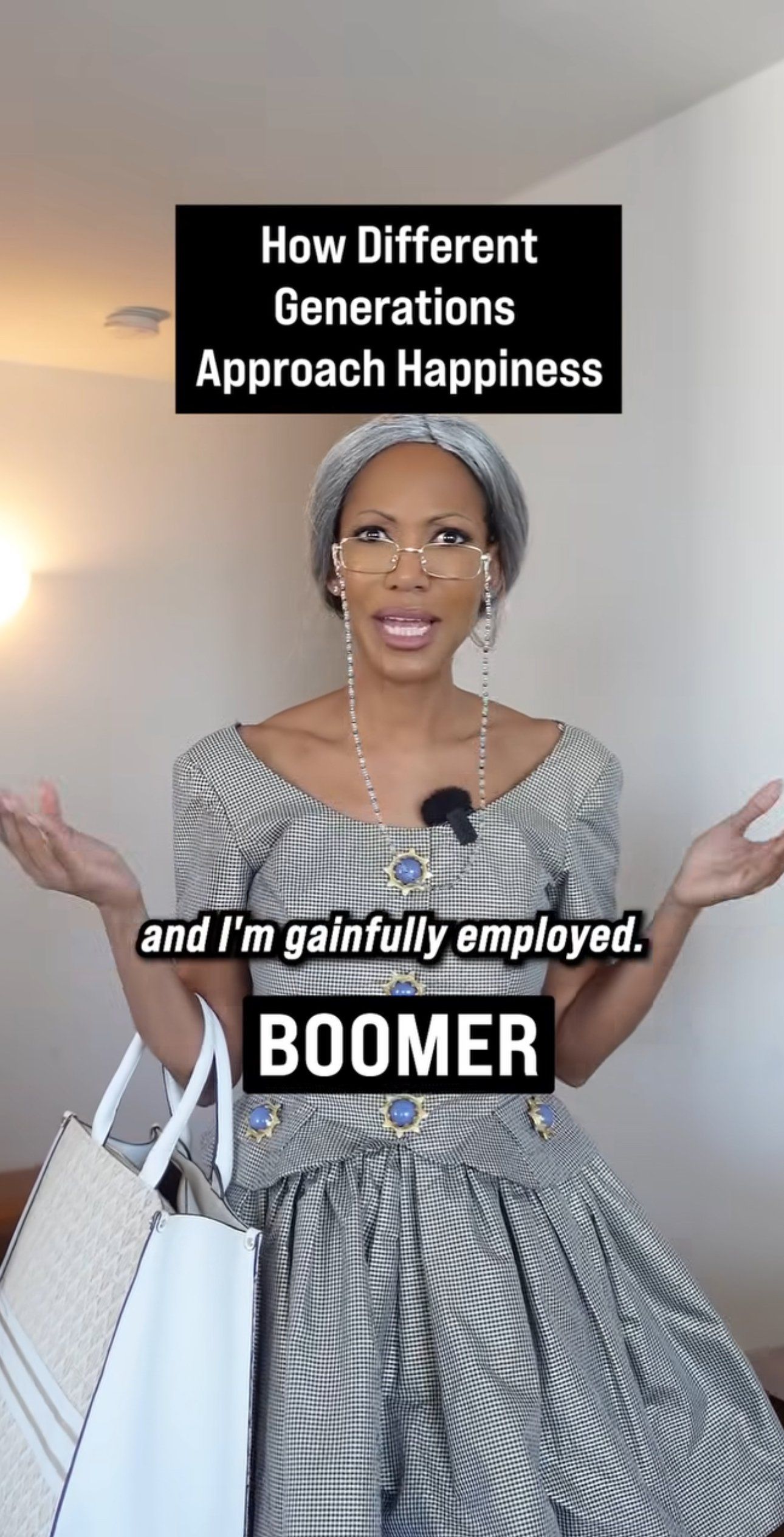
Dr. Joseph emphasizes this in her video when she emulates Baby Boomers, saying: "Of course I'm happy! I have a roof over my head, three hot meals a day, and I'm gainfully employed. What's there to be sad about?"
Generation X: The pragmatic generation
" Gen X was raised in the age of materialistic accumulation, and they were in the age of improving their individual states rather than focusing on those around them," Dr. Joseph observes.
"They were praised for being 'doers' and when situations were hard, they took a 'can-do' approach and focused on self-improvement strategies," she continues. "They were raised in a society that valued wealth and objects as symbols of status, and they often delayed happiness for the future."
Generation X, born between 1965 and 1980, came of age and witnessed economic uncertainty, recessions, and the end of the Cold War during their formative years. These experiences formed a pragmatic relationship with happiness, viewing it as something that can only be earned through hard work and delayed gratification.
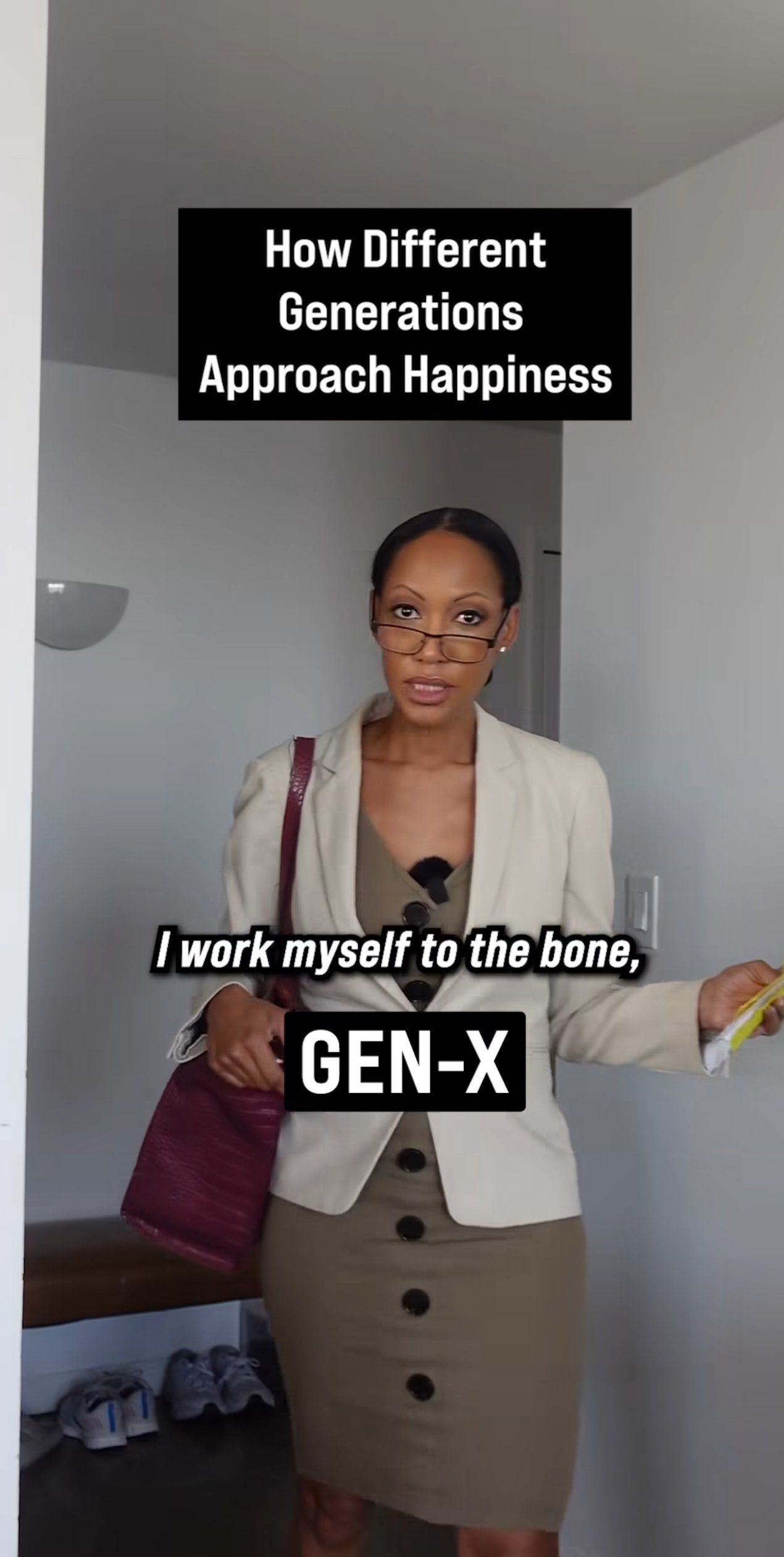
In her Gen X get-up, a business suit worn straight home from the office, Dr. Joseph describes this generation's approach to happiness as thus:
"I work myself to the bone, but one day I'll have enough money in my bank to travel the world. I'll delay happiness until retirement."
Millennials: The meaning-seeking generation
Millennials represent a fundamental shift in the ways happiness is defined and pursued. Born between 1981 and 1996, unlike previous generations, Millennials prioritize meaningful work and experiences over material possessions.
"Millennials grew up in the age of internet convenience. They were the first generation to be born into an age of online access to platforms," Dr. Joseph explains. This unprecedented access to information and global connectivity shaped their worldview in profound ways. "They were also the first to have access to online knowledge and resources, so they search for a better life and meaning," she notes. "They are often overwhelmed with the idea of 'having it all' and they have high levels of financial stress, which makes happiness seem out of reach."
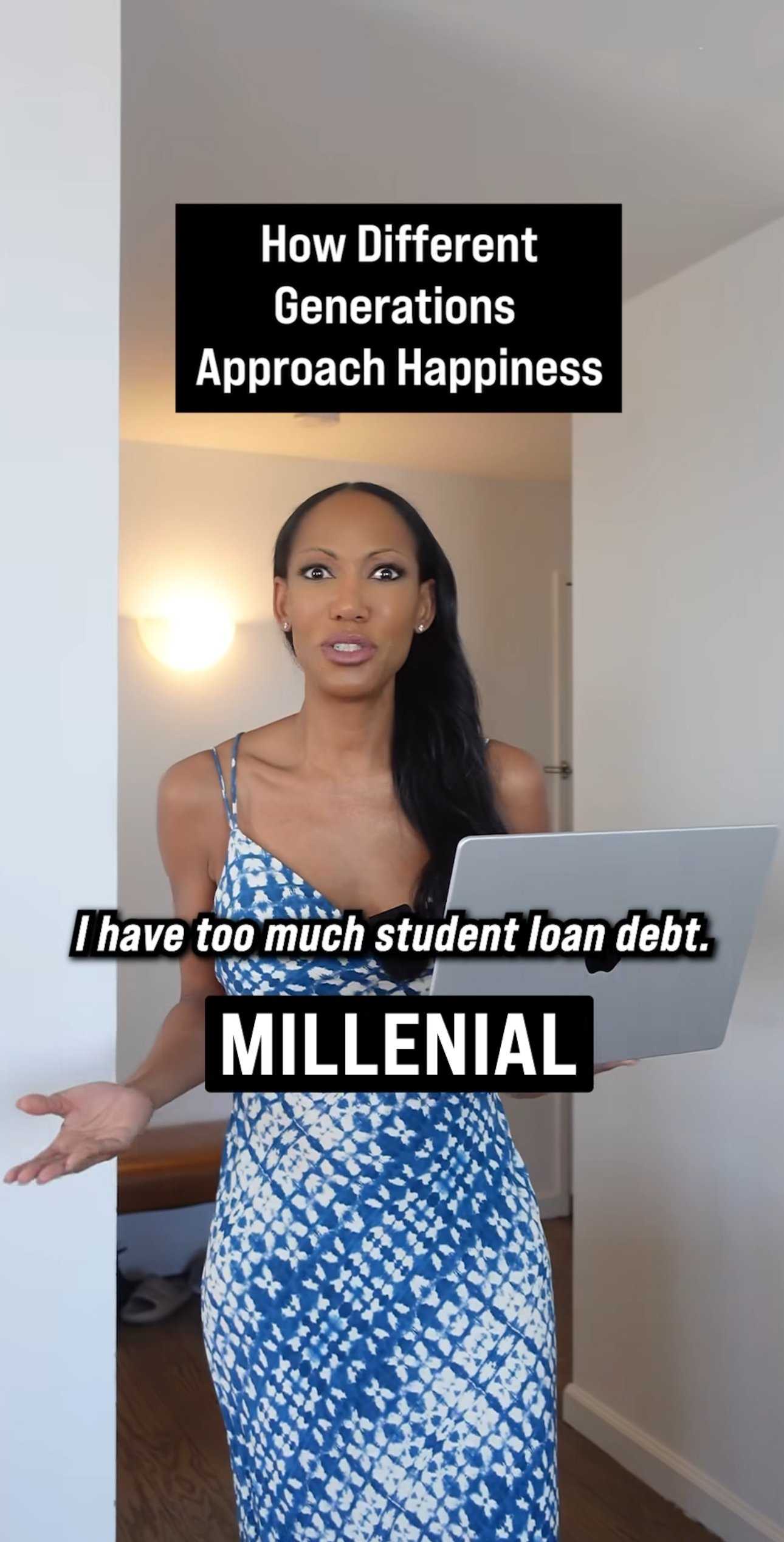
The Millennial approach to happiness often sounds like this: "I was just telling my therapist on our Zoom session that I can't afford to be happy. I have too much student loan debt."
Talk about accuracy.
Generation Z: The authentic generation
The youngest generation mentioned, Gen Z (born between 1997 and 2012), has the most complex, multi-faceted relationship to happiness. "Gen Z grew up in the age of social media where they connect in a digital age as digital natives," Dr. Joseph explains. "Their interactions online are just as valuable as interactions in person."
Happiness is deeply tied to authenticity and social justice for Zoomers. "They are deliberate about their choices to value their chosen community and set rigid boundaries and advocate openly for their preferences," Dr. Joseph notes. Gen Z has witnessed climate change, school shootings, political upheaval, and a global pandemic during their formative years, creating a unique perspective on what matters most.
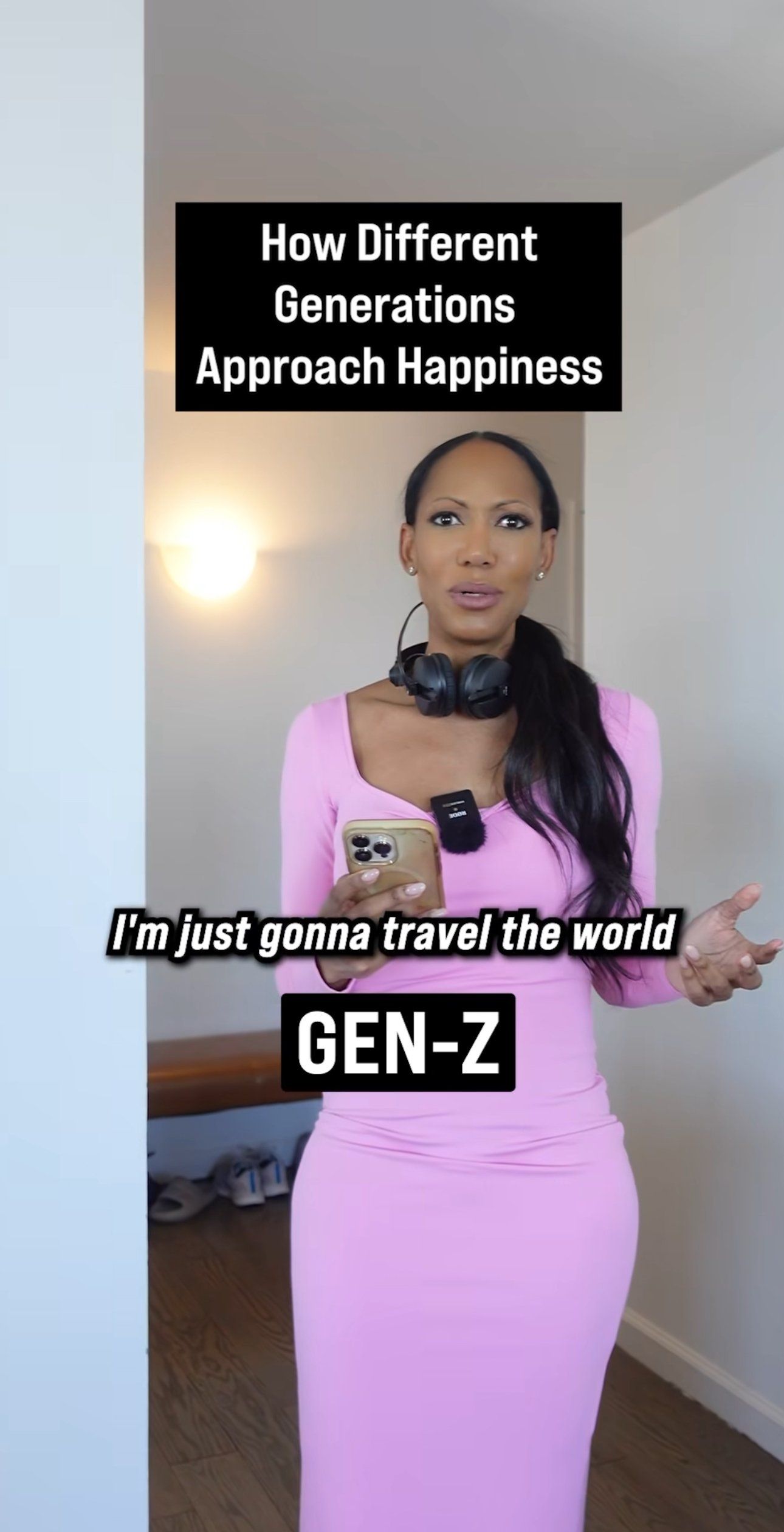
"They are fed up with the system that selects a small group for financial superiority and aren't afraid to leave a system that seems skewed for the wealthy," Dr. Joseph observes. This translates into a happiness philosophy that sounds like this: "Um, the world is melting, there's bad news everywhere. I'm just going to travel the world and be happy today because tomorrow isn't promised."
Your generation's experiences shaped you. That's okay.
Dr. Joseph's viral insights inspire us to recognize that happiness is not a one-size-fits-all concept; it's profoundly personal and shaped by generations. By embracing these differences, we can create empathetic workplaces, strengthen our families, and foster connected communities where everyone is empowered to thrive in their unique ways.






 Thomas Jefferson's Monticello.via
Thomas Jefferson's Monticello.via  The Jefferson Memorial in Washington, D.C.via Joe Ravi/Wikimedia Commons
The Jefferson Memorial in Washington, D.C.via Joe Ravi/Wikimedia Commons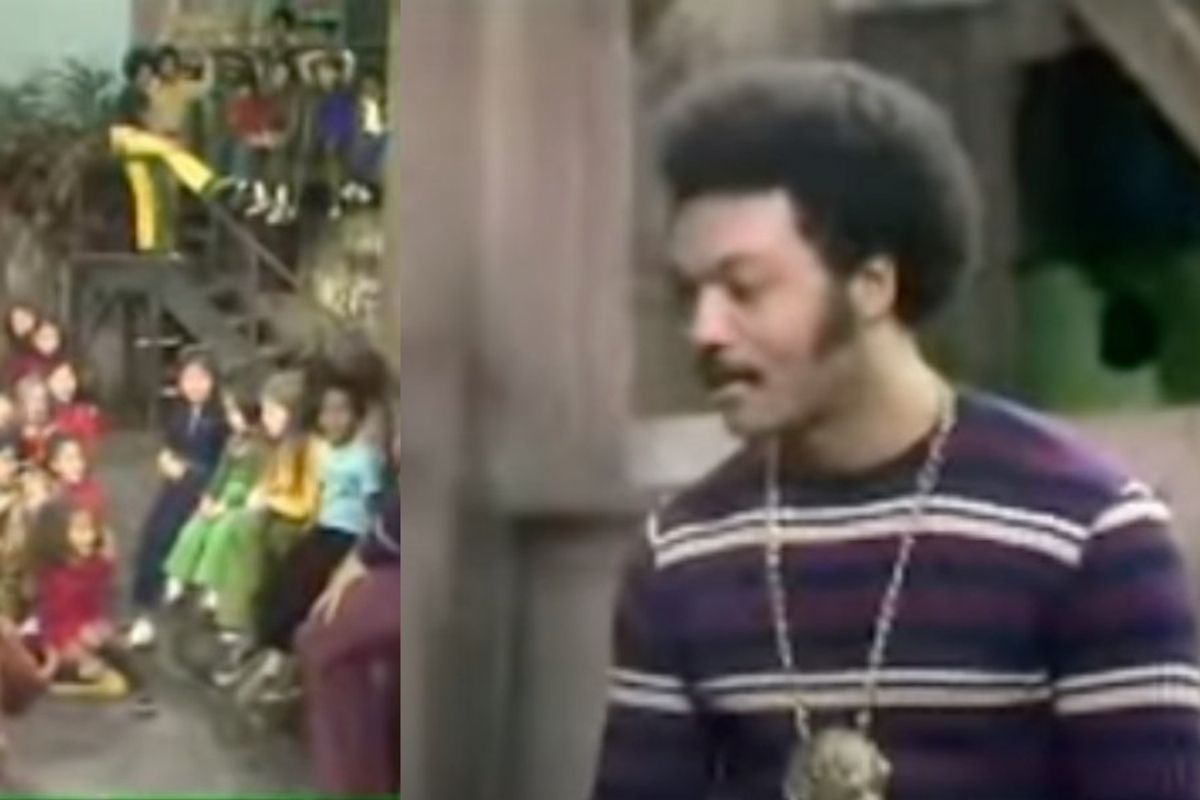

 Indoor cats can enjoy the outdoors safely with a harness and leash.
Indoor cats can enjoy the outdoors safely with a harness and leash.
 Do any of us still make sourdough?
Do any of us still make sourdough?  A fused glass bowl.
A fused glass bowl.  An example of aquascaping.
An example of aquascaping.  Whittled Halloween figures.
Whittled Halloween figures.  A water color painted bookmark.
A water color painted bookmark.  A cross-stitched pattern of a goddess-like woman.
A cross-stitched pattern of a goddess-like woman.  Latte art.
Latte art. A handmade wood cabinet.
A handmade wood cabinet. A watercolor butterfly.
A watercolor butterfly. An oil portrait of a baby.
An oil portrait of a baby.  Pressed four leaf clovers.
Pressed four leaf clovers.  A clay pumpkin.
A clay pumpkin.
 Gary Smalley and John Trent's personality test
Gary Smalley and John Trent's personality test A lion roams.
A lion roams.  An otter is surprised.
An otter is surprised.  Beaver enjoying a snack.
Beaver enjoying a snack.  Golden Retriever adorably looks up.
Golden Retriever adorably looks up.